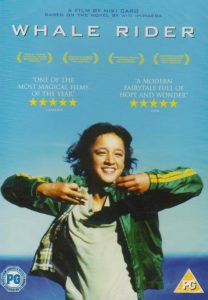
Do you know about Maori culture (of the native people of New Zealand)?
I didn’t know much, so that’s why I found this movie so informative,
in addition to its beautiful storyline! (It also brought back fond
memories of the year I lived in Kiribati, another country known for
its rich culture centered around the ocean.)
みんなはマオリ族の文化を知っているかしら?(ニュージーランドの先住民族の事よ)
私はよくは知らなかったのだけど、だからこの映画を見つけて、マオリについて素敵なストーリーを知ることが出来たの(それにこの映画は私が以前キリバスに住んでいた記憶を思い出させたわ、キリバスは海洋が中心に置かれた豊かな文化で知られる国よ)
*Whale Rider* is a very sad story, surrounded by tragic loss and
family tensions, but has a happy ending. The main character, Pai
(short for Paikea – named after the legendary whale rider) struggles
to gain acceptance from her grandfather, who is convinced his people
are doomed because Pai was born a girl (please see the movie for more
explanation). In the end, Pai shows how beautiful a spirit she has,
and her determination ends up helping her people in a surprising way!
「クジラの島の少女」は、人が亡くなったり、それと、家族間にある緊張に囲まれた、とても悲しいお話なんだけど、最後はハッピーエンドが待っているの。
主人公はパイ(パイカを短くした呼び名よ、これはクジラにのった伝説の人物からとられた名前なの)彼女は彼女を受け入れることが出来ない彼女の祖父との確執にあがいているの。マオリ族の族長である彼女の祖父は人が死ぬなどの災いは、パイが女の子として生まれてきたせいだと信じているの。(どうか詳しい説明は映画を見てね。)
最後、パイは、どれ程美しい精神をもっているか彼に見せ、予期せぬ方法で彼女の決心はマオリの人々を救うことになるのよ!
Anyway, when the tragedy occurs in the beginning of the movie, the
grandfather says “What’s done is done.” This expression is used when
nothing can be done about a bad situation. The event is in the past
and can’t be changed. Japanese people often use the expression “Shou
ga nai” in this kind of situation.
さて、映画の冒頭部分、悲劇が起こった時、族長が「What’s done is done」と言うんだけど、この言い回しは、よくない事が起こった時、もう出来ることは何もない。という様な時に使うの。その出来事が起こってしまった、そしてもう結果を変えることが出来ない。というような時ね。日本人は、よくこんな時「しょうがない」と言うわね。
I don’t want to say more because I don’t want to ruin the movie for
you. Please see it if you haven’t already, especially if you love the
ocean like me!
もう、これ以上は言わないことにするわね、だって、映画のイメージを壊すといけないもの。もしまだこの映画を見ていないなら、ぜひ観てみてね。特に私みたいに海が好きな人にはお勧めよ!!
Stay cool!
またね、元気で!
Cara



















